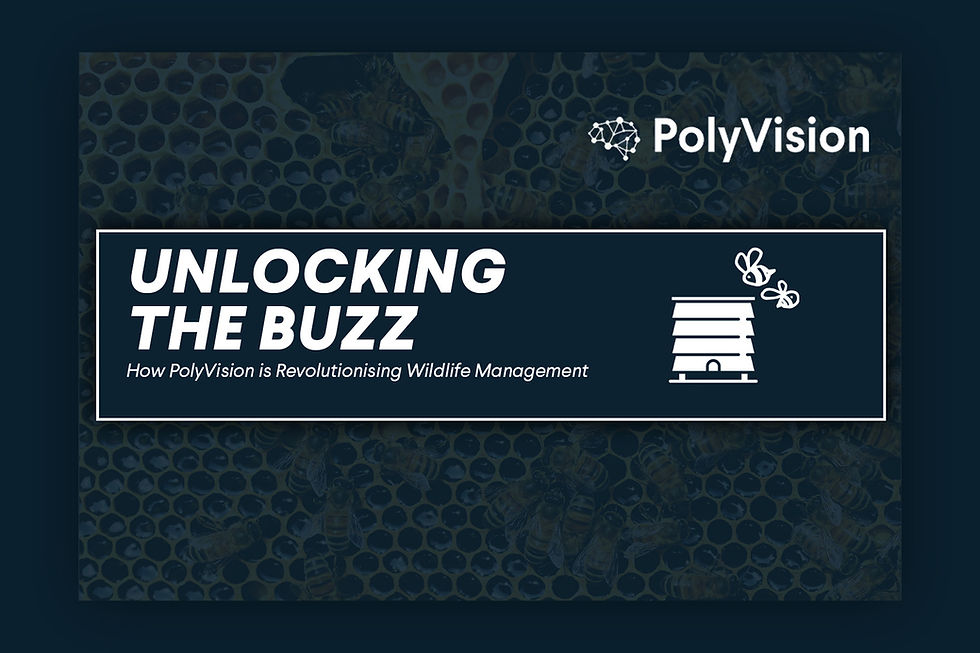Unlocking the Buzz with PolyVision Hive Management
- Shaun Coghlan

- Oct 10, 2023
- 3 min read
Updated: Oct 10
In the heart of Queensland, Australia, where the vibrant landscapes extend as far as the eye can see, an unexpected technological marvel has taken root to protect one of nature's tiniest but most vital creatures: bees.

Launching a trial in 2019, the Queensland Beekeepers' Association (QBA), a longstanding advocate for beekeeping in the region, found a surprising ally in the form of PolyVision, an innovative platform that harnesses the power of AI cameras to aid in the conservation and management of bee populations. Through this article, we’ll explore how this remarkable synergy between technology and ecology is reshaping the landscape of wildlife management.

The QBA and Its Legacy
Established in 1886, the Queensland Beekeepers' Association is an organisation composed of both professional apiarists and amateur beekeepers who share a common passion for beekeeping. Over the years, the QBA has emerged as the leading voice for the Queensland honey bee industry. Their mission extends beyond the love of honey production; it encompasses the crucial role bees play in pollination and the broader ecological balance.
Enter PolyVision: A New Approach to Wildlife Management
In 2019, a pioneering collaboration took place between the QBA and a team of visionaries known as Lynkz. Lynkz developed a Cloud-based AI monitoring solution, which involved setting up cameras focused on beehives and transmitting the footage to the "PolyVision Animal Service." This AI algorithm was specifically tailored to analyse the movement of bees in and out of the hive, offering unprecedented insights for hive management and bee conservation.

Revolutionising Hive Management
Traditionally, monitoring the health and activity of beehives was a labour-intensive process. Beekeepers often resorted to manual hive weighing using scales, a method plagued by inaccuracy and the need for frequent on-site visits. With the introduction of PolyVision, the game changed entirely.
The Lynkz solution allowed for real-time analysis of hive health and the precise tracking of bee movements. By harnessing AI to monitor bee activity, it became possible to determine hive volumes accurately. This newfound efficiency eliminated the need for manual weighing and cut down on labour costs associated with site visits, leading to significant cost savings for beekeepers.
The Triumph of Timeliness
One of the most remarkable outcomes of this collaboration was the ability to monitor beehives in a timelier manner. With PolyVision, beekeepers can receive instantaneous updates about hive activity, ensuring that any issues or concerns can be addressed promptly. This rapid response can be a game-changer when it comes to managing bee populations, preventing diseases, and optimizing honey production.
A Bee's Eye View: Implications for Conservation
The significance of PolyVision AI cameras extends far beyond mere convenience for beekeepers. By closely tracking bee activity and hive health, this technology contributes to the broader conversation about bee conservation. Bees play a pivotal role in pollinating a vast array of plants, including many of our food crops. Therefore, monitoring their populations and ensuring their well-being is crucial for maintaining biodiversity and food security.
Additionally, the PolyVision AI cameras allow beekeepers to gain a deeper understanding of the intricate behaviour of bees. This knowledge can be used to refine beekeeping practices, making them more sustainable and bee-friendly.
In conclusion, PolyVision AI cameras are not just changing the game for beekeepers; they are reshaping the way we think about wildlife management. By providing a deeper insight into the lives of bees, they empower us to protect these crucial pollinators and sustain the delicate balance of nature they help maintain. The buzz of innovation in Queensland may well be the key to a brighter, more bee-friendly future for us all.


